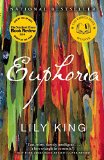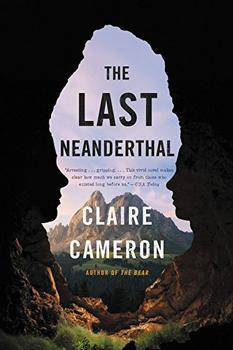Summary | Excerpt | Reading Guide | Reviews | Beyond the book | Read-Alikes | Genres & Themes | Author Bio

This is a damn good book. It's a compelling story with fascinating characters. Cover to cover, it is just a really great read.
Now that we've got that out of the way I want to suggest you ignore other professional reviews of Lily King's Euphoria, at least until after you've read the book yourself. Don't get me wrong. There are no spoilers. But, had I read the reviews, I might have been turned off of this terrific novel about three scientists studying indigenous New Guinea tribes at the height of anthropology's golden age, the early 1930s. Here's the thing. Most of the reviews I've read (post book) wax on and on about famed anthropologist Margaret Mead and how much research King did in order to write the novel. This book is too fine to place so much emphasis on research, and for me, it is even misleading.
Yes, it's obvious that King knows whereof she's speaking when she plunges us into the heart of the New Guinea jungle. Every mud-caked, bug infested (after making love the couple, "brushed the bugs out of our crotches"), outdoor weeing ("Before I could decide the proper distance at which to stand, her water began to flow at an astonishing rate and kept on for a great while."), stinky, slippery detail is manifest on just about every page. And there is much information about tribal customs that, while they might jar faint-of-heart Western sensibilities, truly augment the sense of this foreign place. Plus there is the vibrant time period. It is post-WW I and pre-WW II, and there is a kind of tenuous optimism that the world just might hold some redeeming value.
However this is a work of fiction. Yes, research is important in its authentic details that contribute to the feeling the author delivers. But that feeling hits home – or not – by the way the characters interact with their realities and with each other. (We praise Masters and Johnson for the breadth and accuracy of their research. We don't praise E.L. James for hers. It's the punch, not the behind-the-scenes that carries a work of fiction.)
Thus, last but not least are King's vividly drawn characters: Nell Stone, who has become internationally famous for her shocking first book about the customs of a tribe she'd previously studied; her unpublished husband Fen; and Andrew Bankson, the couple's new acquaintance and a fellow anthropologist. Deeper, more fully developed characters would be hard to come by in modern literature. That they may or may not be loosely based upon actual persons is irrelevant to the story. That their circumstances may or may not be loosely based upon actual events? Again, irrelevant. This is a love triangle. It is also a jealous triangle of professional accomplishment.
Nell abandons herself almost completely to the tribe she is investigating, but maintains enough distance to record her observations. For her, the immersion – her work – boils down to a single moment of comprehension, when "the place feels entirely yours. It's the briefest, purest euphoria." But she cautions that it doesn't last. It can't, because humans and their societies are too complex. She remains undeterred however and is fully as work-absorbed as Fen is self-absorbed.
From the moment he is introduced – via the gimlet eye of narrator Bankson – Fen is portrayed as heedless of anything but his own purposes. For example, during a hasty canoe departure from a tribe the couple had been studying, he tells Nell that one of the natives hurled a dead baby at them. "He had broken her glasses by then, so she didn't know if he was joking." This comment is especially hurtful, we learn, because Nell had recently suffered a miscarriage. Bankson, himself, falls in love with Nell, becoming both a personal and professional admirer. Then, of course, he stirs Fen's jealousy and, by encouraging Nell's devotion to work, he alters their dynamic as a couple. Sometime later Nell observes, "personality depends on context…Certain people bring out certain traits in each other…You don't always see how much other people are shaping you." It is a statement that, more than anything, sums up an overriding theme of Euphoria: the way interaction and communication, or lack thereof, shapes people.
King powerfully portrays the interplay of these three characters and their effect upon each other and, to a lesser extent, on the tribes they are supposed to be observing. But all of them – in their own distinct ways – judge, affect, and even shape their experience of others.
I relished the ironies, the humor, and the paradoxes in the novel as much as the friable characters and vibrant setting. No need for all the almost exclusive focus on research in those other reviews. All King's efforts in that arena are fine and they helped, but Euphoria stands solidly on her literary merits.
![]() This review was originally published in The BookBrowse Review in July 2014, and has been updated for the
April 2015 edition.
Click here to go to this issue.
This review was originally published in The BookBrowse Review in July 2014, and has been updated for the
April 2015 edition.
Click here to go to this issue.

If you liked Euphoria, try these:

by Tan Twan Eng
Published 2024
From the bestselling author of The Garden of Evening Mists, a spellbinding novel about love and betrayal, colonialism and revolution, storytelling and redemption.

by Claire Cameron
Published 2018
From the author of The Bear, the enthralling story of two women separated by millennia, but linked by an epic journey that will transform them both.
Your guide toexceptional books
BookBrowse seeks out and recommends the best in contemporary fiction and nonfiction—books that not only engage and entertain but also deepen our understanding of ourselves and the world around us.